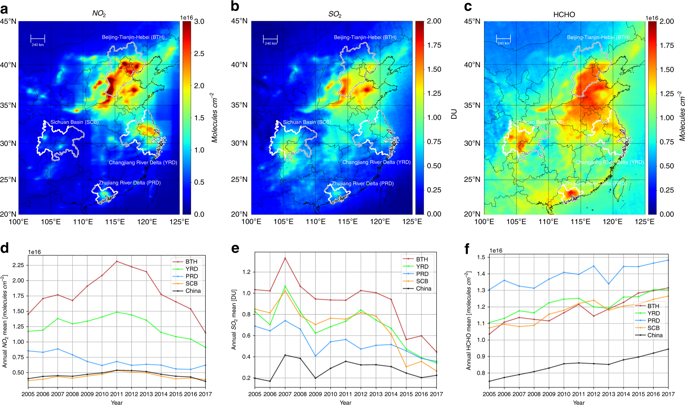Light: Science & Applications ( IF 19.4 ) Pub Date : 2019-11-13 , DOI: 10.1038/s41377-019-0210-6 Chengxin Zhang , Cheng Liu , Qihou Hu , Zhaonan Cai , Wenjing Su , Congzi Xia , Yizhi Zhu , Siwen Wang , Jianguo Liu

|
Abundances of a range of air pollutants can be inferred from satellite UV-Vis spectroscopy measurements by using the unique absorption signatures of gas species. Here, we implemented several spectral fitting methods to retrieve tropospheric NO2, SO2, and HCHO from the ozone monitoring instrument (OMI), with radiative simulations providing necessary information on the interactions of scattered solar light within the atmosphere. We analyzed the spatial distribution and temporal trends of satellite-observed air pollutants over eastern China during 2005–2017, especially in heavily polluted regions. We found significant decreasing trends in NO2 and SO2 since 2011 over most regions, despite varying temporal features and turning points. In contrast, an overall increasing trend was identified for tropospheric HCHO over these regions in recent years. Furthermore, generalized additive models were implemented to understand the driving forces of air quality trends in China and assess the effectiveness of emission controls. Our results indicated that although meteorological parameters, such as wind, water vapor, solar radiation and temperature, mainly dominated the day-to-day and seasonal fluctuations in air pollutants, anthropogenic emissions played a unique role in the long-term variation in the ambient concentrations of NO2, SO2, and HCHO in the past 13 years. Generally, recent declines in NO2 and SO2 could be attributed to emission reductions due to effective air quality policies, and the opposite trends in HCHO may urge the need to control anthropogenic volatile organic compound (VOC) emissions.



























 京公网安备 11010802027423号
京公网安备 11010802027423号